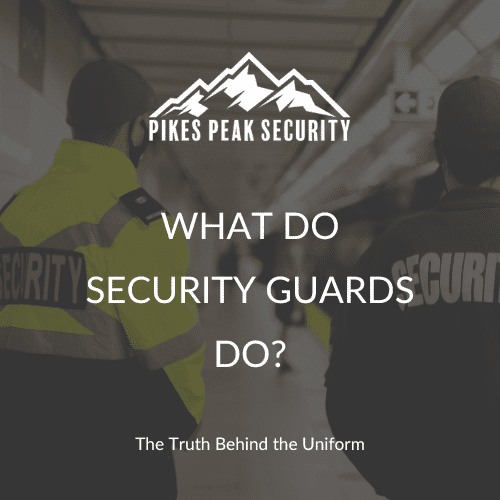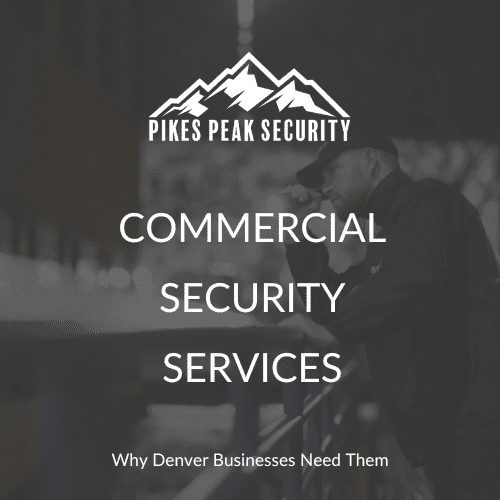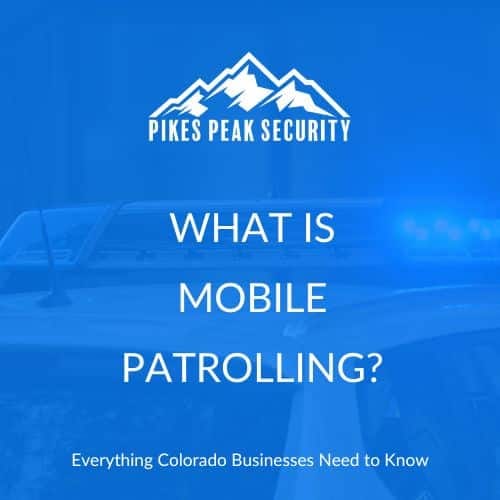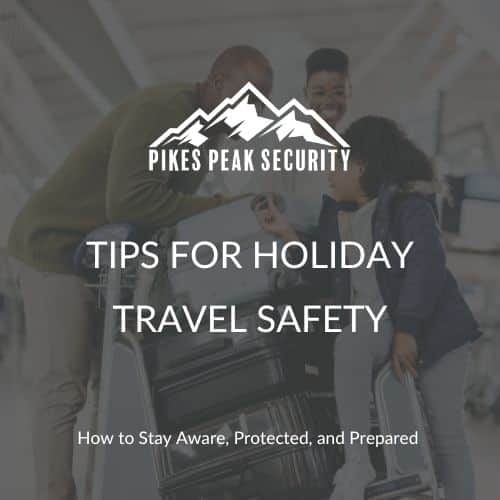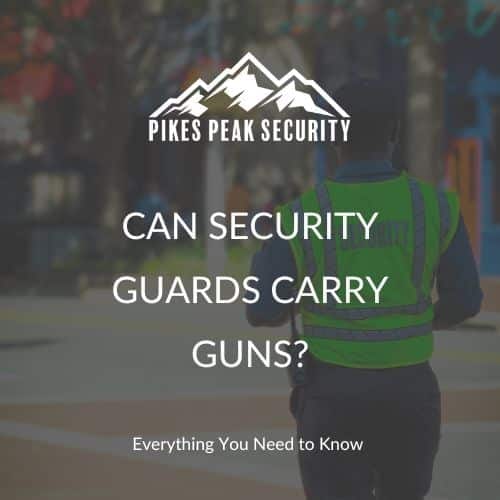Security guards are often the first line of defense against potential threats. Whether it’s event security, small business protection, or keeping an eye on residential areas, every shift starts with a core mission: prevent crime, monitor for suspicious activity, and respond quickly when needed. All while respecting Colorado laws and regulations.
At Pikes Peak Security, we’re proud to serve Colorado with integrity, professionalism, and unmatched dedication. Every day, our guards step into a role that demands vigilance, quick thinking, and a deep respect for the communities we protect. While we may not wear a badge like law enforcement, our presence makes a difference — whether we’re patrolling neighborhoods, managing event crowds, or safeguarding businesses.
Here’s a closer look at what a day on the job really looks like, and what you should know if you’re considering hiring or becoming a security guard.

A Day at Work for a Security Guard
While security guards are not law enforcement, they play a significant role in community safety. Security guards cover a variety of service areas.
Each day consists of preventing crime, monitoring for suspicious behavior, and responding decisively to security incidents within our jurisdiction while adhering to local laws and regulations.
Typical duties often include:
- Enforcing rules and policies
- Operating surveillance and other security equipment
- Maintaining control of who enters and exits
- Responding to alarms and disturbances
- Observing and documenting suspicious behavior
At its core, the job is about prevention — stopping problems before they start and creating a safe environment for everyone on site.

What Is Legal for Security Guards to Do?
Security guards are subject to strict legal limitations that vary by jurisdiction. In Colorado, guards must follow all state and local laws regarding detainment, the use of force, and search procedures. Understanding what security guards are legally allowed — and not allowed — to do is critical for both professionals in the field and the general public.
Actions Security Guards Can Legally Take:
- Protect private property and deny entry when necessary
- Request individuals to leave a premises
- Observe and report suspicious behavior
- Detain individuals for a reasonable amount of time under specific circumstances
- Request identification
- Carry weapons with proper licensing
- Request a voluntary search
- Use reasonable force when responding to threats
Actions Security Guards Cannot Legally Take:
- Make arrests (except under limited citizen’s arrest conditions)
- Carry firearms without the appropriate license
- Conduct searches without consent
- Use excessive or unnecessary force
- Detain individuals for extended periods without legal cause
These legal boundaries are designed to protect both the public and the integrity of the security profession.
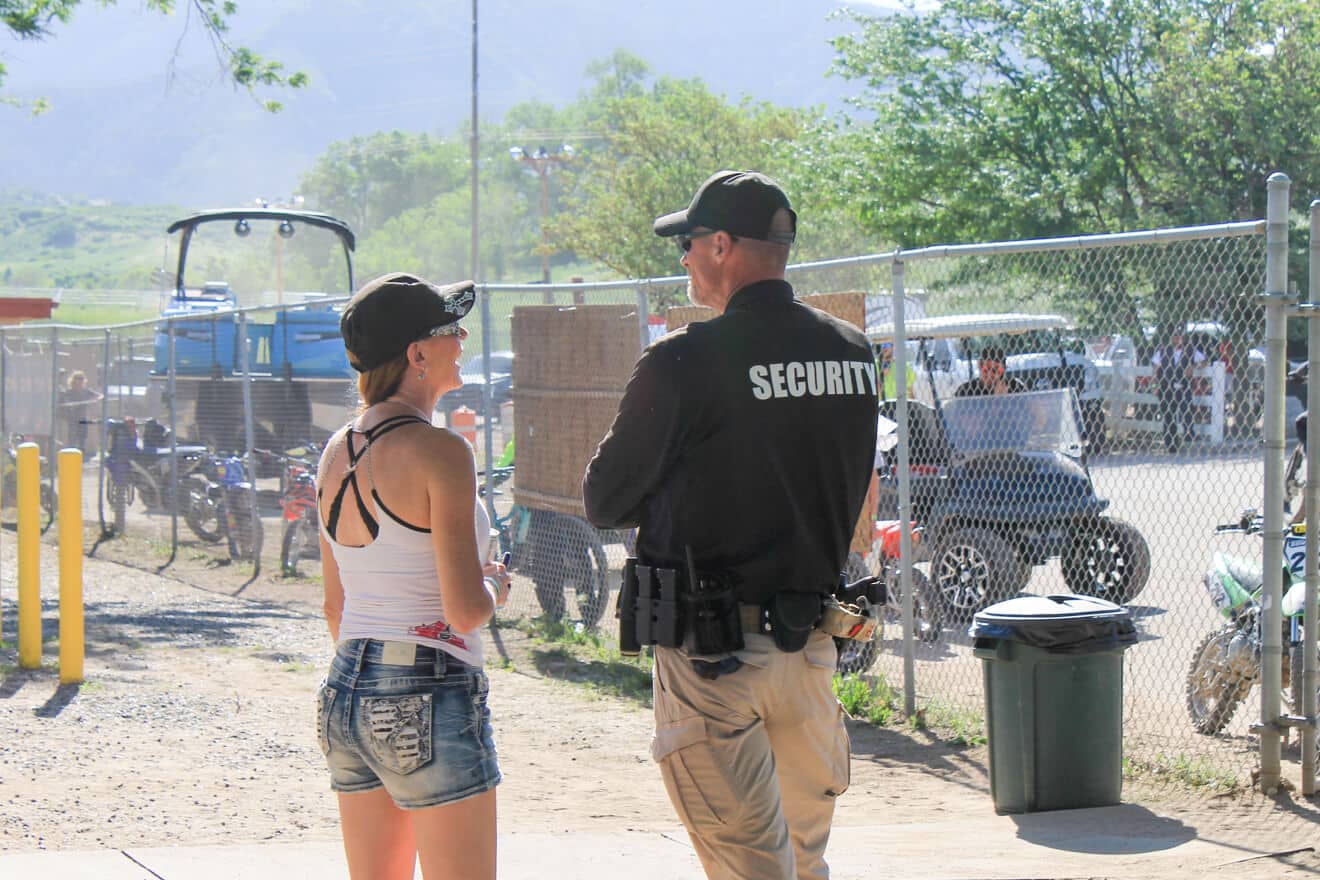
The Different Types of Security Guards
The security industry includes a range of specialized roles based on the needs of the property or event. Common types of security guards include:
- Unarmed security guards
- Armed security guards
- Event security personnel
- Retail security guards
- Residential security officers
- School and campus security staff
Each position comes with different levels of responsibility, risk, and required training. For example, not all guards are armed. Unarmed guards typically focus on monitoring, reporting, and access control, while armed guards are trained to handle higher-risk environments where the potential for violent incidents may be greater.
Armed roles require additional licensing, background checks, and firearm proficiency to ensure both safety and legal compliance. The assignment and training level ultimately depend on the specific needs of the property, event, or client being served.

What’s a Typical Job Description for a Security Guard?
A standard job description for a security guard focuses on surveillance, incident prevention, and enforcement of property rules. Specific job functions often include:
- Patrolling designated areas
- Monitoring surveillance equipment
- Managing access control points
- Responding to and reporting alarms
- Communicating with emergency services when needed
Additional responsibilities may also involve writing detailed incident reports, performing routine equipment checks, and interacting with visitors or employees to ensure compliance with security procedures. In some cases, guards may assist in emergency evacuations, administer basic first aid, or support law enforcement when appropriate.
Security guards are often the first line of defense in protecting people and property. Their presence alone can be a strong deterrent to potential threats, and their ability to respond quickly and professionally can help prevent incidents from escalating.

Training and Certifications for Security Guards
Professional security guards undergo extensive training to ensure they are equipped to handle a wide range of real-world scenarios.
Training typically begins with foundational instruction in arrest control techniques and crowd management, preparing guards to safely de-escalate situations and maintain order in high-traffic or high-stress environments.
Those assigned to armed positions also receive specialized training in firearms handling, safety, and legal responsibilities, as well as use of force protocols that emphasize proportionate and lawful responses.
First aid and basic lifesaving skills are another essential component of security training. Guards are often the first to respond to medical emergencies, so knowing how to administer CPR or assist with injuries can be critical. Scenario-based emergency response training further prepares guards for incidents such as fires, threats, or evacuations, helping them stay calm, follow procedures, and act quickly under pressure.
In Colorado, security guards must obtain a license and complete security guard training to meet state requirements. High-quality training not only ensures compliance, but also builds confidence, professionalism, and preparedness on the job.

Common Questions About Security Services
The role of a security guard can vary depending on the setting, the level of risk, and the specific needs of a site or client. Below are some of the most commonly asked questions about security services, responsibilities, and training to help clarify what to expect from professional security personnel.
Is Being a Security Guard a High-Stress Job?
The level of stress experienced on the job varies by role and assignment. Positions involving regular emergency response or conflict management can be high-pressure, while those centered on routine monitoring and patrol may be lower-stress. Regardless of the post, security professionals must remain alert, responsive, and capable of handling unexpected situations.
Are Security Guards Required to Be Armed?
Not all security positions require a firearm. The need for armed versus unarmed guards depends on the specific site, threat level, and client requirements. However, even unarmed guards often receive comprehensive defensive training.
Are Security Guards Trained in First Aid?
Basic first aid and lifesaving techniques are standard parts of most professional security training programs. This ensures that guards can respond appropriately in medical emergencies until emergency services arrive.
Is a License or Insurance Required?
In Colorado, security companies and guards must be properly licensed and insured. Individual guards working in armed roles must also meet certain licensing requirements. Licensing helps ensure that both companies and guards adhere to safety standards, legal requirements, and best practices.
What Areas in Colorado Commonly Use Private Security?
Security services are used across a wide range of locations in Colorado, including:
- Colorado Springs
- Denver
- Aurora
- Castle Rock
- Surrounding urban and suburban areas
Demand for professional security continues to grow as businesses, schools, event organizers, and private communities seek proactive safety solutions.

See How Pikes Peak Security Is Raising the Bar for Security Guards
When it comes to protecting your property, employees, or event attendees, professional security services provide peace of mind and reliable protection. Experienced, well-trained security guards act as a powerful deterrent against crime and help ensure swift, effective responses to any incidents.
At Pikes Peak Security, we take security seriously. With our security guards, you won’t experience them scrolling their phones, ignoring their surroundings, or cutting corners. Instead, each guard is fully engaged, alert, and committed to maintaining a safe environment. Trained to the highest standards, they actively monitor, assess, and respond to any potential risks, ensuring protection you can truly count on.
Don’t leave safety to chance. Reach out to Pikes Peak Security to get guards you can trust and count on when it matters most.


